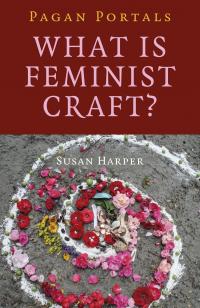
June in the Wheel of the Year Part 1: Not Just the Solstice - Lucya Starza
 This is the first in a series of posts I’m writing for the Moon Books Blog on the theme of the Wheel of the Year. The idea is that eventually the posts will be compiled and edited into the chapters for a book: Pagan Portals – Wheel of the Year.
This is the first in a series of posts I’m writing for the Moon Books Blog on the theme of the Wheel of the Year. The idea is that eventually the posts will be compiled and edited into the chapters for a book: Pagan Portals – Wheel of the Year.
I’ll be covering a lot more than just the eight Wheel of the Year festivals of Imbolc, Spring Equinox, Beltane, Summer Solstice, Lammas, Autumn Equinox, Samhain, and Winter Solstice. While it’s useful to have a set date to get together with other pagans for a ritual, every single day has its own energy, and the wheel of the year turns smoothly around, it doesn’t click over on eight bumpy cogs. So, although I’ll be covering the Sabbats of Wicca and similar forms of modern paganism, I’ll also be going into other ways to honour the seasons. I’ll look at magic for each month, folklore, deities, crafts and what’s happening in the natural world.
The big festival this month is the Solstice, on 21 June, which is in summer in the Northern Hemisphere, where I’m based, and in winter for those in the Southern Hemisphere. I’ll be covering the Summer Solstice in depth in a later post, but in this first blog entry I’m taking a look at other dates to celebrate or commemorate in the month of June.
Birthdays: Ancestors of Tradition
Some of the most influential figures of the modern pagan revival were born in June. Alex Sanders, who founded the Alexandrian tradition of Wicca and was called the King of the Witches, was born on 6 June 1926. Gerald Brosseau Gardner is considered the father of the modern Wiccan movement. He was born on 13 June 1884. William Butler Yeats, who was a member of the Hermetic Order of the Golden Dawn and whose poetry was inspired by Irish mythology, was also born on 13 June, in 1865. Then, Philip Ross Nichols, who founded the Order of Bards, Ovates and Druids, was born on 28 June 1902.
Father’s Day
People in the UK, US and many parts of the world celebrate Father’s Day on the third Sunday in June. It’s so commercialised that it’s hard not to be aware of the date each year, although the holiday isn’t ancient. It began in the early 1900s and gained international recognition due to the work of a US woman, Sonora Smart Dodd. Nevertheless, it would a good time to remember male ancestors of tradition, such as Gardner, Sanders, and Nichols. Although it’s primarily a secular festival, on Father’s Day you could also choose to honour father gods, such as Odin the All-Father from Norse mythology.
Goddess Days
So much for the men, here are a few June festivals associated with Ancient Roman goddesses, and ways to celebrate them today.
The first day, or Kalends, of June is the festival of Carna, the Ancient Roman goddess of the heart who protects from vampiric attacks, and Cardea, her fellow goddess of hinges and doors. You could cleanse the entrance to your home, oil hinges, and hang a hawthorn branch or other protective charm above your front door.
June 9 to 15 was a festival for Vesta, goddess of the hearth and home. People would visit her temple with bread and flowers, and it was ritually cleansed at the end. Celebrate by baking bread, making an offering to Vesta then thoroughly cleaning your own home, especially your kitchen and sacred spaces. The goddess Fortuna was honoured on 24 June with drinking, merry making and playing games. Similar could be done today.
Days for the Eco Spirituality
Many see paganism as a nature religion with eco-spirituality at its heart, but several days this month encourage everyone to focus on those themes. June 5 is World Environment Day, June 8 is World Oceans Day, and June 18 is an international day for combatting drought. Most of us can do more to protect the environment. We can take part in activities to clear plastic and other waste from rivers, lakes and beaches, we can plant trees, and we can try to reduce our use of man-made products, reusing them and recycling them at the end of their life. We can also try to reduce the impact of our own pagan festivals on the environment. Celebrate close to home or use public transport rather than cars to get to events, avoid single-use plastic at picnics or parties, and most of all take rubbish home to dispose of in the most environmentally friendly way possible.
In my following blog posts for June I’ll be looking at flower folklore, spells, divination, the Solstice and midsummer. My earlier books include Pagan Portals – Candle Magic and Pagan Portals – Guided Visualisations. I edited the community book Every Day Magic – A Pagan Book of Days.
Categories:
0 comments on this article






